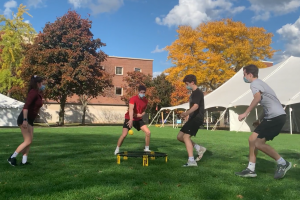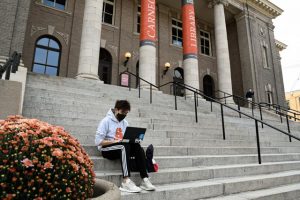8 ways to stay productive over summer break
8 ways to stay productive over summer break

Whether you’re finishing up your first year at Syracuse University, or you’re a few months away from starting your senior year, summer break presents a myriad of opportunities to stay productive.
Adam Capozzi, the director of career services, assessment and student success at SU’s Career Services, believes students should use their time wisely in between the spring and fall semesters.
“While summer is a student’s time to take a ‘mental and physical break’ from the rigors of the academic year, it does not mean they should just press pause during this time,” Capozzi said. “Summers should be used to gain experience you cannot get inside a classroom.”
Although summer internships are usually what first comes to mind, the uncertainty of the pandemic has impacted the format and number of opportunities available to many undergraduate students. Instead, here are some other ways to maximize your summer break and gain valuable experience for your future.
1. Take summer classes through SU or a local college near you.
Lighten your course load for future semesters and boost your GPA by enrolling in Syracuse Summer Sessions or classes offered at a college close to you. This summer, SU is offering both in-person and online options that can range from two to 12 weeks. The full course offerings can be found through the class search feature on MySlice.
If you are unsure which courses to take, you can utilize DegreeWorks, an audit service that tracks which courses or requirements have been fulfilled or still need to be completed. This feature, as well as the registration deadlines for each Syracuse Summer Session, can be found on MySlice.
For those that wish to take classes at a different school and transfer credits towards their degree at SU, a portion of the university’s academic rules listed on the course catalog state that you must receive approval from your home college before enrolling. As each home college’s procedures are different, the first step would be to speak with your advisor.
New Article: 7 Tips on Writing an Effective Scholarship or College Essay. Everything you need to know for writing amazing scholarship essays and college essays. https://t.co/BsOiuJdM0C pic.twitter.com/E9597fxRM7
— Fastweb Scholarships (@PayingForSchool) May 11, 2021
2. Apply for scholarships.
Websites like Niche, Scholarships.com, Fastweb, and Cappex act as free search engines for college students to find available scholarships sponsored by companies, professional organizations and academic groups.
Many of them, such as Niche, allow you to complete an in-depth profile to find scholarshipd and grant matches that pertain to your academic studies, interests or eligibility. Use your downtime to send in some applications that could help you finance your tuition payments and reduce post-grad student loans.

3. Attend virtual networking and leadership development events.
Capozzi believes that both types of programs are beneficial for students. More specifically, he said leadership development events allow attendees to sharpen their skills and hear insight from industry experts while networking events create opportunities to practice professional communication and find new contacts.
Advertisements and information for upcoming programs can be found on Linkedin or Handshake, the SU Alumni Association website, and event-planning platforms such as Eventbrite.

4. Volunteer for a local organization or cause that you’re interested in.
The summer is a perfect time to make a positive impact in your community, and manage your residual stress from this past semester. Covey, a non-profit organization, cited a 2018 study on volunteering and health, which discovered that individuals who volunteer regularly experienced an 8.5% increase in mental health and a 9% increase in physical health.
Another potential benefit of volunteering, as noted in a Scholarships.com resource page, is building connections in a professional area you may wish to build a career in.
Laurel Hossler, an SU biotechnology junior, believes that her time volunteering for the Delaware Division of Fish and Wildlife last summer combined her personal interests with her future goals.
“I plan on pursuing a career working with wildlife, and this volunteer experience allowed me to gather experience and connections for my future,” Hossler said, “Especially during COVID-19, I needed to do something that made me feel productive and volunteering allowed me to do that.”

5. Create a personal website.
Spend some time this summer building a website to improve your professional presence online. In a digital age, your digital footprint is extremely important when it comes to applying to internships or job opportunities; according to a 2020 survey from The Manifest, about 98% of businesses complete background research on job applicants while 43% research possible candidates through Google.
A LinkedIn article also noted that a personal website can act as a visual, in-depth resume to showcase work samples, relevant documents and achievements. Services like WordPress, Wix, and Squarespace offer both free and paid options to build your website.

6. Polish your LinkedIn and Handshake accounts.
Similar to a personal website, your LinkedIn and Handshake profiles allow you to control how employers view you as a professional. Make sure that both of your accounts include details of any relevant skills, experiences, extracurricular involvements and accolades.
With over 55 million registered companies on LinkedIn and 500,000 employers on Handshake, updating and tweaking your profiles can be extremely helpful for future career prospects.

7. Start taking steps towards your post-grad plans.
If you are interested in or seeking an additional higher education degree, such as a master’s, or going to law or medical school. You might choose to spend time this summer researching and outlining what your next steps should be.
For students still in the process of considering their future education options, Abound, a college guidance program, recommends utilizing platforms like LinkedIn to find professionals currently working in your desired career field and conduct informational interviews about their educational background. It is also recommended to spend some time envisioning your own goals and capabilities to determine a potential timeline for the degree program you are interested in.
Those actively preparing for additional education after undergrad, can find additional information through organizations that specialize in those fields, such as the Law School Admission Council, Educational Testing Service, or Association of Medical American Colleges websites. These sites offer resources to prepare for required standardized tests, the application process, well as offering search engines that’ll help you find the right institution.
The summer is also a perfect opportunity to find a tutor, prep course, or practice materials for a standardized test through companies like Princeton Review, Kaplan Test Prep, or Khan Academy.

8. Utilize SU Career Services over the summer.
According to Capozzi, SU Career Services is still available to meet with students even after the academic year ends. Their services involve career coaching, which includes discussing the relationship between majors or courses and careers, finding networking opportunities, resume and cover letter feedback, and interview practices as well as pre-professional advising for students pursuing careers in health or law.
Schedule an appointment with a career exploration specialist or advisor through Handshake, where you can indicate your preference to meet over a phone call, Zoom, or Microsoft Teams.








